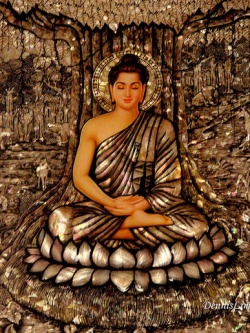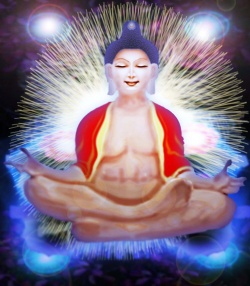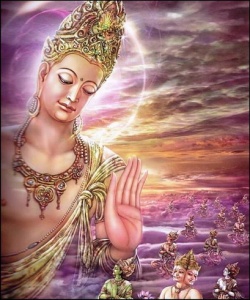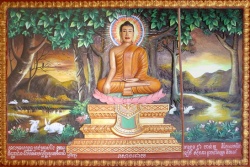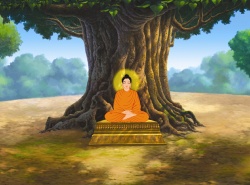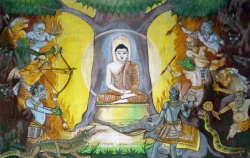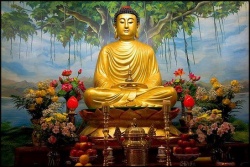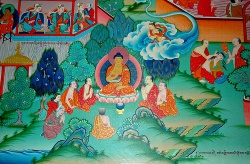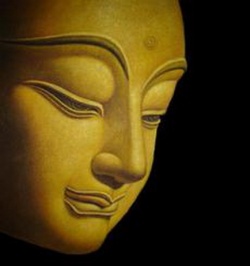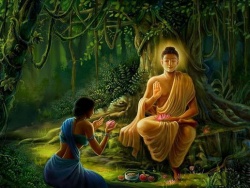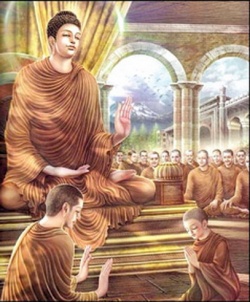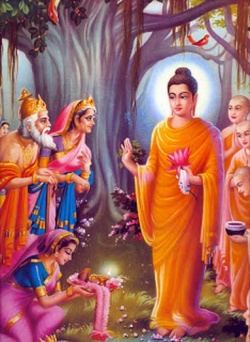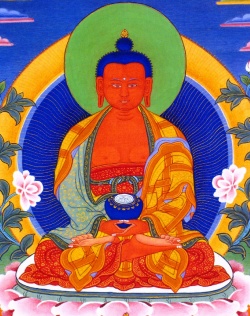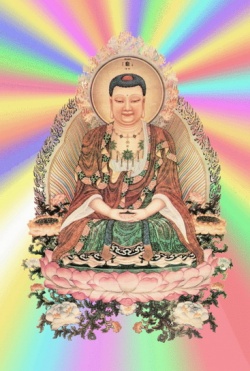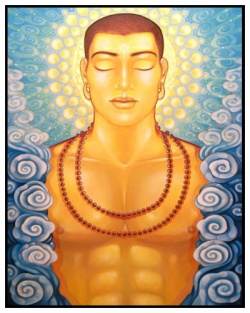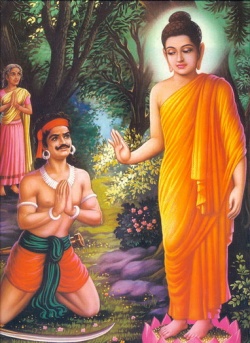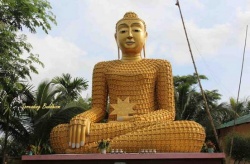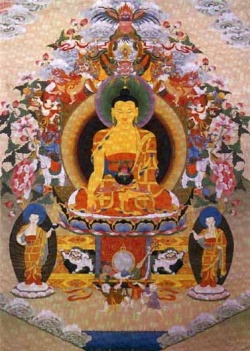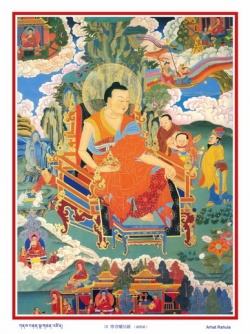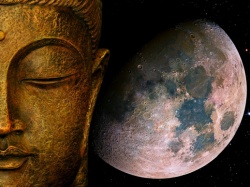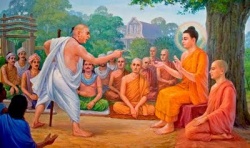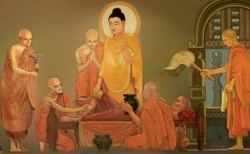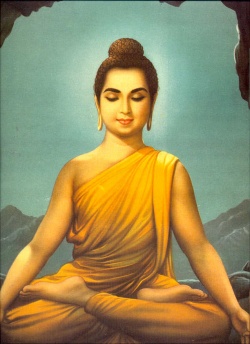The Dharmapada in a Practical Order
- With impermanence as money,
- Buy the renunciation-soil,
- Build up the sila-wall,
- Sow the Bodhicitta-seeds,
- Irrigate with mercy-water,
- Manured by Dhyana,
- Comes blooming of the wisdom flower,
- Ripening of the Buddha fruit.
The statement of these eight steps on the Path to Full Enlightenment is a result of my study of four different editions of the Chinese Tripitaka, and the experience of my twenty years of practice. These eight steps are now to be taken as the basis of a new classification of the Dharmapada for the sake of practice, in place of the old one which has neither any theoretical system nor practical sequence.
1. With Impermanence as Money
"Impermanence", as stated by the great Sage Milarepa, "is the very gate through which one steps into the field of Right-Dharma." All mankind worries about how to live well, but cares little about how to die well and get a holy rebirth. Hence there are many obstacles to the occurrence of full enlightenment. Readers should take hold of this idea of impermanence and occupy your whole heart and soul and time with the verses under this classification until it becomes a strong power which may help you overwhelm all obstacles and achieve full renunciation. The reader may then read and meditate upon the verses of the second step of the Dharmapada.
The first number in the following list represents my new order for the Dharmapadas while the number in parentheses is the traditional number of that Dharmapada.
l. (135) As a cowherd with his staff drives his cows to pasture, so do Old Age and Death drive the life of men.
2. (286) "Here I shall dwell in the rain, here in winter and summer," thus the fool fancies and does not think of his death.
3. (287) Death comes and carries off that man absorbed in his children and flocks, his mind distracted, as a flood carries off a sleeping village.
4. (62) "These sons belong to me, and this wealth belongs to me," with such thoughts a fool is tormented. He himself does not belong to himself, how much less sons and wealth?
5. (48) Death overpowers a man who is gathering flowers (of sensual pleasures), and whose mind is distracted, before he is satiated in his pleasures.
6. (47) Death carries off a man who is gathering flowers (of sensual pleasures) and whose mind is distracted, as a flood carries off a sleeping village.
7. (128) Not in the sky, not in the midst of the sea, not if one enters into the clefts of the mountains, is there known a spot in the whole world where if a man abide, death could not overcome him.
8. (41) Before long, alas! this body will lie on the ground, despised, bereft of consciousness, like a useless log.
9. (147) Look at this beautiful image, a mass of sores, a pile-up, infirm, much thought of, which has nothing lasting or stable!
10. (148) This body is wasted, frail, a nest of disease; this heap of corruption breaks into pieces, life indeed ends in death.
11. (149) Those bleaching bones, like gourds thrown away in the autumn, what pleasure is there in looking at them?
12. (150) Of bones is (this) city made, covered with flesh and blood, and there dwell in it old age and death, pride and deceit.
13. (155) Men who have not led a religious life and have not laid up treasures in their youth, perish like old herons in a lake without fish.
14. (156) Men who have not lived a religious life, and have not laid up treasure in their youth, lie like worn-out bows, sighing after the past.
15. (235) You are now like a withered leaf, the messengers of Death wait on you; you stand on the threshold of decay, and you have no provision for your journey.
16. (237) Your life has come to an end, you are setting out to the presence of death, there is no resting place for you on the road, and you have no provision for your journey.
17. (288) Sons are no help, nor a father, nor relations; there is no help from kinsfolk for one whom Death has seized.
18.-19. (153,154) I wandered through many a birth in Samsara, seeking but not finding the builder of this house. Sorrowful is repeated birth. But now, house-builder, you are seen. You shall build no house again. All your rafters are broken, your ridge pole is shattered. My mind goes to dissolution (Nirvana).
20. (126) Some are born in a womb, the wicked are born in hell; the pious go to heaven, those who are free from all evil propensities gain Nirvana.
21. (170) Look upon the world as a bubble, look upon it as a mirage; the king of Death does not see him who thus looks down upon the world.
22. (151) Even the ornamented royal chariots wear out, the body too approaches old age, but the virtue of good people decays notthus do the good say to the good.
23. (182) Difficult is birth as man, difficult is the life of mortals, difficult is the hearing of the Sublime Truth, difficult is the appearance of a Buddha.
24. (146) What laughter, what exultation when the world is ever burning? You, who are by darkness surrounded, why will you not seek the light?
25. (289) Understanding this fact let the wise man, restrained by morality, quickly clear the way that leads to Nirvana.
26. (46) He who knows that this body is like froth and has learned that it is as insubstantial as a mirage, will break the flower-tipped arrows of sensual pleasure (Mara), and never see the King of Death.
II. Buy the Renunciation Soil
When you have actually achieved full renunciation, you should keep and think over in your mind all the verses under this classification. You must reflect within yourself whether you are only following outward renunciation or whether you have progressed even with inward renunciation.
27. (75) One is the road that leads to wealth, another the road that leads to Nirvana; if the monk, the disciple of Buddha, has learnt this he will not delight in the praise of men, he will strive after separation from the world.
28. (85) Few are there among men who arrive at the thither shore (become Arhats); the other people here merely run up and down the shore.
29. (86) But those who act according to the Teaching, when the Law has been well preached to them, will reach the further shore, crossing the realm of passion, so hard to traverse.
30. (174) This world is dark, few only can see here: a few only go to heaven, like birds escaped from the net.
31. (7) He who lives looking for pleasure only, his senses uncontrolled, immoderate in his food, idle and weak, Mara (the tempter) will surely overthrow, as the wind throws down a weak tree.
32. (175) Swans travel on the path of the sun; (men) travel through air by psychic powers. The wise are led away from the world, having conquered Mara and his host.
33. (335) Whomsoever in this world this base-clinging thirst overcomes, his sorrows flourish like well-watered Birana grass.
34. (212) From pleasure comes grief, from pleasure comes fear; he who is free from pleasure neither sorrows nor fears.
35. (213) From affection comes grief, from affection comes fear; he who is free from affection neither sorrows nor fears.
36. (214) From attachment comes grief, from attachment comes fear; he who is free from attachment neither sorrows nor fears.
37. (215) From lust comes grief, from lust comes fear; he who is free from lust neither sorrows nor fears.
38. (216) From craving comes grief, from craving comes fear; he who is free from craving neither sorrows nor fears.
39. (339) Powerful, lustful thoughts carry off that misunderstanding man in whom the thirty-six streams (of craving) that flow towards pleasurable objects are strong.
40. (341) To beings there arise pleasures that rush (towards objects of sense) and are moistened (with craving). These men bent on pleasure, seeking happiness, undergo (again and again) birth and decay.
41. (342) Men, entwined in craving, are terrified like the bound hare. Held fast by fetters and bonds they undergo sorrow again and again.
42. (343) Men, entwined in craving, are terrified like the bound hare. Therefore a monk who wishes to be free from passions should discard craving.
43. (345) Wise people do not call that a strong fetter which is made of iron or wood or hemp. Far stronger is the passionate devotion to precious stones and rings, to sons and wives.
44. (346) Wise people call that bond strong which drags down, and though yielding, is hard to undo; having cut this (bond) people retire from the world with no backward glance, leaving behind the pleasures of sense.
45. (349) If a man is agitated by evil thoughts, swayed by strong passions, and yearning only for what is pleasurable, his craving will grow more and more and he will indeed make his fetters strong.
46. (355) Riches destroy the foolish, if they look not for the other shore; by his thirst for riches the foolish man destroys himself as if he were his own enemy.
47-49. (190,191,192) He who seeks refuge in the Buddha, the Dharma, and the Sangha, he who sees with right knowledge the Four Noble TruthsSorrow, the Cause of Sorrow, the Transcending of Sorrow, and the Noble Eightfold Path which leads to the Cessation of Sorrow; this indeed is refuge secure; this indeed is refuge supreme. Seeking such refuge one is released from all sorrow.
50. (61) If a seeker should not find a companion who is his better or equal, he should resolutely pursue a solitary course. There is no fellowship with the foolish.
51. (396) I do not call a man a Brahman merely because he is born of womb or sprung from a Brahman mother, he is supercilious in his mode of address and in his wealth; but the poor man who is free from attachments, him I call indeed a Brahman.
52. (8) The man who lives meditating on the "Impurities," with senses restrained, moderate in his food, with confidence and strenuous effort, him Mara will certainly not overthrow, any more than the wind throws down a rock mountain.
53. (89) Those whose minds are well-grounded in the Factors of Enlightenment, who rejoice in the renunciation of affections and in freedom from attachment, who are corruption-free and who are full of light, are completely liberated even in this world.
54. (32) A monk (Bhikshu) who delights in earnestness, who looks with fear on thoughtlessness, cannot fall away (from his perfect state)he is close upon Nirvana.
55. (57) Mara never finds the path of those who are full of virtue, abiding in earnestness and emancipated through true knowledge.
56. (109) If a man has the habit of reverence and ever respects the aged, four things will increase to him: life, beauty, happiness, power.
57.-58. (104,105) One's own self conquered is better than the conquest of all other people; not even a god or a demi-god or Mara with Brahma can change into defeat the victory of a man who has vanquished himself.
59. (90) There is no suffering for him who has finished his journey, and abandoned grief, who has freed himself on all sides, and thrown off all fetters.
60. (168) Rouse yourself! Do not be idle! Follow the path of righteousness and shun transgression. The righteous man rests in bliss, in this world and in the next.
61. (181) Even the gods envy those who are awakened and mindful, who are given to meditation, who are steadfast and delight in the peace of retirement (from the world).
62-63. (271-272) Not merely by discipline and vows, nor again by much learning, not by entering into meditation, nor yet by sleeping apart do I earn the bliss of release which no worldling can know. Monk, be not confident as long as thou hast not attained the extinction of desire.
64. (194) Happy is the birth of a Buddha, Happy is the teaching of the Noble Doctrine, Happy is the unity of the Sangha, Happy is the asceticism of the united.
65. (219) Kinsmen, friends, and well-wishers salute a man who has been long away, and returns safe from afar.
66. (220) In like manner his good works receive him who has done good, and has gone from this world to the other; as kinsmen receive one who is dear to them on his return.
67. (290) If by leaving a small pleasure one sees a great pleasure, let a wise man leave the small pleasure and look to the great.
68. (302) Difficult is renunciation, difficult is to delight therein. Difficult and painful is household life. Painful is association with unequals. Pain befalls a wanderer in Samsara. Therefore, do not be a wanderer, do not be a pursuer of pain.
69. (348) Let go the past, let go the future, let go the present (front, back, and middle). Crossing to the farther shore of existence, with mind altogether free, do not again undergo birth and decay.
70. (305) He who, unwearied, sits alone, sleeps alone, and walks alone, who, alone, subdues himself, will find delight in the outskirts of the forest.
71. (351) He who has reached the Goal, he who is fearless, devoid of craving, passionless, has broken all the thorns of life; this will be his last body.
72. (344) He who, free from desire, gives himself up to desire again; who, having escaped from this jungle, runs back into itcome behold that man, though released he runs back into bondage.
73. (347) Those who are immersed in lust, run down the stream (of desires) as a spider runs down the web which he himself has spun; having cut this (bond), the steadfast retire from the world, with no backward glance, leaving all sorrow behind.
74. (352) He who is without craving and without attachment, who understands the words of the ancient dialect, who knows the order of lettersthose which are before and which are afteris truly wise; he has received his last body.
75. (73) The fool will desire undue reputation, precedence amongst monks, authority in the monasteries, honor among other people.
76. (74) "Let the laymen and the monks both think that this was done by myself. In every work, great or small, let them refer to me"Such is the aspiration of the fool, his desires and pride increase.
77. (171) Come, behold this world, like unto an ornamented royal chariot! Herein fools flounder, but for the wise there is no attraction.
78. (325) When one is torpid, gluttonous, sleepy, rolls himself around like a great hog fed on pig wash, that fool is born again and again.
79. (334) The craving of a man addicted to careless living grows like a creeper. He jumps from life to life like a fruit-loving monkey in the forest.
80. (394) What is the use of your platted hair, O witless man! What is the use of your antelope garment? Within you are full (of passions), but the outside you make clean.
81. (12) What is real they deem as real, what is unreal they deem as unreal; they who abide in the pasture-ground of right thoughts, arrive at the real.
82. (25) By effort, earnestness, discipline, and self-control, let the wise man make for himself an island which no flood can overwhelm.
83. (29) Heedful amongst the heedless, wide awake amongst the sleepy, the wise man advances like a swift horse, leaving behind the hack.
84. (31) The Bhikshu who delights in earnestness, and looks with fear on negligence, advances like fire, burning all fetters, great and small.
85. (172) He who was formerly slothful and afterwards overcomes his sloth, brightens up this world, like the moon when freed from clouds.
86.-87. (186, 187) Not by a shower of gold coins does contentment arise in sensual pleasures. Of little sweetness, but painful, are sensual pleasures. Knowing this, the wise man finds no delight in heavenly pleasures. The disciple of the Fully Enlightened One delights only in the destruction of every craving.
88. (336) Whoso in this world overcomes this base unruly cravingfrom him sorrows fall away, like water-drops from a lotus-leaf.
89. (367) He who has no "I and me" (conception) whatever towards mind and body, he who grieves not for that which he has nothe indeed is called a Bhikshu.
90. (384) When a Brahman has reached the other shore in two states (tranquility and insight), he is freed from all bonds as a result of his knowledge.
91. (399) He who without anger endures reproach, flogging and punishments, he whose power, the potent army, is patiencehim I call a Brahman.
92. (353) I have overcome all, I know all; I am detached from all, I have renounced all; I am wholly absorbed on the "Destruction of Craving" (Arhatship). Having comprehended all by myself, whom shall I call my teacher?
93. (204) Health is the greatest of blessings, contentment is the greatest wealth, trust is the best of relationships, Nirvana the highest happiness.
94. (407) Him I call indeed a Brahman from whom lust and hatred, pride and envy, have dropped like a mustard seed from the point of a needle.
95. (371) Meditate, O Bhikshu! Do not be heedless. Do not let your mind whirl on sensual pleasures. Do not be careless and swallow a lead-ball and you need not cry out in the midst of fire, "This is pain."
96. (340) Everywhere flow the floods (cravings). The creeper (of passion) sprouts and stands. Seeing the creeper that has sprung up, with wisdom, cut off the root.
97. (337) Therefore this with your kind leave I say unto you, to all who are assembled here: Dig up the root of craving as one in quest of Birana's sweet root, lest Mara crush you again and again, even as a stream crushes the reeds.
98. (397). Him I call indeed a Brahman who has cut off all fetters, who never trembles, and is unchecked and emancipated.
99. (398) Him I call indeed a Brahman who has cut the strap (hatred), the thong (craving), and the rope (heresies), together with the appendages (latent tendencies), he who has raised the cross-bar (ignorance), he who is enlightened (Buddha).
100. (402) Him I call indeed a Brahman who realizes, here itself, the destruction of one's sorrow, he who has laid the burden aside and is emancipated.
101. (167) Do not follow the evil law! Do not live on in thoughtlessness! Do not follow false doctrines! Be not a friend of the world.
102. (415) Him I call indeed a Brahman who, having given up all sensual pleasures in this world, would renounce and become a homeless one; he who has destroyed sense-desires and becoming.
103. (404) Him I call indeed a Brahman who keeps aloof from both householders and the houseless, who wanders about without a home and has but few desires.
104. (210) Seek no intimacy with the beloved, and never with the unbeloved; not seeing the beloved, and the sight of the unbeloved are both painful.
105. (91) The mindful exert themselves, to no abode are they attached. Like swans that quit their pools, home after home they abandon (and go).
106. (92) Those who do not accumulate, those who reflect well over their food, those whose object is the void and unconditional freedom, their course cannot be traced, like that of birds in air.
107. (93) He whose corruptions are destroyed, who is moderate in food, he whose object is the Void and unconditional freedom, his path cannot be traced, like that of birds in air.
108. (95) Such a man who does his duty is tolerant like the earth, like a stone set in a threshold; he is like a lake without mud; no new births are in store for him.
109. (98) In hamlet or in a forest, on the sea or on the dry land, wherever venerable persons (Arhats) dwell, that place is delightful.
110. (208) Therefore one should follow the wise, the intelligent, the learned, the much enduring, the dutiful, the noble; one should follow a good and wise man, as the moon follows the path of the stars.
111. (99) Delightful are the forests where worldlings find no joy. There the passionless will rejoice, (for) they seek no sensual pleasures.
112. (416) Him indeed I call a Brahman who, having forsaken and utterly eradicated craving, would renounce and become a homeless one; he who has destroyed craving and becoming.
113. (211) One should not hold anything dear, for separation from the beloved is painful. Those who hold nothing dear and hate nothing, have no fetters.
114. (418) Him I call indeed a Brahman who has given up likes and dislikes, who is cold and free from all germs (of renewed life), the hero who has conquered all the worlds.
115. (417) Him I call indeed a Brahman who, after casting off bondage to men, has risen above bondage to the gods, and is free from all and every bondage.
116. (421 ) Him I call indeed a Brahman who has no clinging to aggregates that are past, future, or present; who is without clinging and grasping.
117. (410) Him I call indeed a Brahman who fosters no desires for this world or for the next, who is desireless and emancipated.
118. (327) Delight in earnestness, guard your mind well. Draw yourself out of the evil way like an elephant sunk in the mire.
119. (329) If a man finds no prudent companion to walk with, no one who is upright and steadfast, let him walk alone like a king who has left his conquered country behindlike an elephant in the forest.
120. (207) He who consorts with fools suffers a long journey; company with fools, as with an enemy, is always painful; company with the steadfast is pleasant like meeting with kinsfolk.
III. Build up the Sila Wall
If you found out renunciation was very difficult to keep, you must build up the Sila Wall. All the verses under this classification may help you attain full purification. The doctrines of Hinayana may then be integrated into your faithful practice and the foundation of the Arhat position will then be in your hands.
121. (330) It is better to live alone, there is no companionship with a fool; You should live alone doing no evil, and with few wishes, like an elephant in the forest.
122. (55) Sandal-wood, Tagara, lotus, jasmineof all these kinds of fragrance, the perfume of virtue is by far the best.
123. (236) Make an island unto yourself, strive hard and be wise; purged of stain, and passionless, you shall enter the celestial plane of the Elect.
124. (238) Make an island unto yourself, strive hard and be wise; purged of stain, and passionless, you will not come again to birth and decay.
125. (401) Him I call indeed a Brahman who does not cling to the sensual pleasures any more than water to a lotus leaf, or than a mustard seed to the point of a needle.
126. (169) Lead a righteous life, not one that is corrupt. The righteous lives happily both in this world and the next.
127. (1) Mind is the fore-runner of (all evil) conditions. Mind is chief; and all that we are is mind-made. If a man speaks or acts with an evil thought, pain follows him, as wheel follows the foot of the ox that draws the wagon.
128. (2) Mind is the fore-runner of (all evil) conditions. Mind is chief; and all that we are is mind-made. If a man speaks or acts with a pure thought, happiness follows him, like a shadow that never leaves him.
129. (101) Better than a thousand useless stanzas, is a single useful stanza, hearing which one is pacified.
130. (165) By oneself alone, is evil done, by oneself is one defiled. By oneself is evil avoided, by oneself alone, is one purified. Purity and impurity depend on oneself. No one can purify another.
131. (166) One's own welfare should not be neglected because of others' welfare, howsoever great. Perceiving well one's own welfare be zealous regarding self interest.
132. (163) Bad deeds and things not beneficial to self are easy to do. But what is beneficial and good is very, very hard to do indeed.
133. (254) There is no path through the air: no (true) monk is found outside (the Buddhist Order). Mankind delights in obstacles. The Tathagatas are free from obstacles.
134. (251) There is no fire like lust, no grip like hate; there is no net like delusion, no river like craving.
135. (202) There is no fire like lust, no crime like hatred; there is no ill like the body, no bliss higher than Peace (Nirvana).
136. (234) The wise are restrained in body, speech and mind. Yes, they are perfectly restrained.
137. (377) As the jasmine creeper sheds its withered flowers, even so, O bhikshus, should you totally shed lust and hatred.
138. (222) He who holds back rising anger like a rolling chariot, him I call a real driver; other people are but holding the reins.
139. (132) He who, seeking his own happiness, does not injure or kill beings who also long for happiness, will find happiness after death.
140. (226) They who are ever vigilant, who train themselves night and day, who are wholly bent on Nirvanatheir defilements will come to an end.
141. (67) That deed is not well done of which a man must repent and the fruit of which he reaps crying and with a tearful face.
142. (68) That deed is well done of which a man does not repent and the fruit of which he reaps gladly and with joy.
143. (292) What ought to be done is neglected, what ought not to be done is done; the defilements of unruly, heedless people are always increasing.
144. (313) If anything should be done, do it. Promote it with all your might, for slack asceticism scatters dust (of passions) all the more.
145. (116) Make haste in doing good; check your mind from evil, for the mind of him who is slow in doing merit delights in evil.
146. (209) He who devotes himself to that which should be shunned and does not devote himself to that which should be associated with, giving up the quest and attaching himself to the pleasurable, will come to envy him who exerts himself.
147. (118) If a man does what is good, he should do it again and again; he should find pleasure therein: for blissful is the accumulation of good.
148. (117) If a man commits evil, he should not do it again and again; he should not find pleasure therein: painful is the accumulation of evil.
149. (122) Think not lightly of good, saying in your heart, "It will not come nigh unto me." Even a water jar is filled by the falling of drops. Likewise the wise man fills himself with good, gathering little by little.
150. (121) Think not lightly of evil, saying in your heart, "It will not come nigh unto me." Even a water jar is filled by the falling of drops. Likewise the fool fills himself with evil, gathering little by little.
151. (123) Just as a merchant with a small escort and great wealth avoids a perilous way, or just as one desiring to live avoids poison; so should one shun evil.
152. (124) He who has no wound on his hand may carry poison in it. Poison does not affect one who is free from wounds. There is no ill for him who does no wrong.
153. (173) He who by good deeds covers the evil done, illumines this world like the moon freed from clouds.
154. (312) An act carelessly performed, a broken vow, and a wavering obedience to religious disciplineall this bears no great fruit.
155. (314) An evil deed is better left undone, for a misdeed torments one hereafter. A good deed is better done for having done it, one does not feel remorse.
156. (256) A man is not thereby just because he hastily arbitrates; the wise man should investigate both right and wrong.
157. (257) The intelligent man who leads others not falsely but lawfully and impartially and is a guardian of the law is called just.
158. (328) If you find a prudent companion who (is fit) to live with you, who behaves well and is wise, you should live with him joyfully and mindfully overcoming all dangers.
159. (291) He who by causing pain to others wishes to obtain happiness for himself is not released from hatred, being himself entangled in the tangles of hatred.
160. (252) Easily seen are others' faults but hard indeed to see are one's own. A man winnows his neighbors' faults like chaff, but hides his own, even as a dishonest gambler hides a losing throw.
161. (253) He who sees others' faults and is ever irritable, defilements of such a one grow. He is far from the destruction of defilements.
162. (50) One should not regard the faults of others, what they have done or left undone, but his own deeds done and undone.
163. (239) Let a wise man blow away his own impurities as a smith blows away the impurities of silver, one by one, little by little, and from instant to instant.
164. (240) As rust sprung from iron eats into its own source, so do the deeds of a transgressor lead him to a state of woe.
165. (242) Lewd conduct is the taint of woman, niggardliness the taint of a benefactor; tainted are all evil ways in this world and the next.
166. (308) Better to eat a red-hot iron ball like flaring fire, then to live as an immoral, uncontrolled man eating the alms of people.
167. (243) There is a taint worse than all taintsignorance, the greatest taint. Abandoning this taint, be taintless, O Bhikshu!
168. (370) Five cut off, five give up, five further cultivate; the Bhikshu who has gone beyond the five toils is called "One who has crossed the flood."
169. (231) One should guard against misdeeds (caused by) body and be restrained in body. Leave the sins of the body and practice virtue with your body.
170. (129) All tremble at punishment, all fear death. Comparing others with oneself, one should neither kill nor cause others to kill.
171. (130) All tremble at punishment, to all life is dear. Comparing others with oneself, one should neither kill nor cause others to kill.
172. (131) He who, seeking his own happiness, with a rod molests pleasure-loving beings, will not find happiness after death.
173. (270) A man is not one of the Noble (Ariya) because he injures living creatures; he is so called because he refrains from injuring all living creatures.
174. (389) No one should strike a Brahman, nor should such a Brahman let himself fly at his aggressor! Shame on him who strikes a Brahman! More shame on him who gives vent (to his wrath).
175. (241) The taint of Scriptures is non-memorizing, the taint of houses is ill-repair, the taint of (bodily) beauty is sloth; the taint of a watchman, lack of vigilance.
176. (409) Him I call indeed a Brahman who takes nothing in the world that is not given him, be it long or short, small or large, good or bad.
177. (136) A fool does not know when he commits his evil deeds; but the stupid man is consumed by his own deeds, as if burnt by fire.
178. (71) An evil deed committed does not immediately bear fruit just as milk does not curdle at once; smouldering like fire covered with ashes, it follows the fool.
179. (66) Fools of little understanding are their own greatest enemies, for they do evil deeds which must bear bitter fruits.
180. (232) One should guard against misdeeds (caused by) speech and be restrained in speech; give up evil conduct in speech and practice virtue in speech.
181. (6) Others do not know that in this (quarrel) we perish. Those who realize this, their quarrels cease at once.
182. (133) Speak not harshly to any one; those thus addressed will retort. Painful indeed is vindictive speech; exchanging blows may touch you.
183. (134) If like a broken gong, you silence yourself; you have already attained Nirvana. No vindictiveness will be found in you.
184. (230) Who dares blame him who is like refined gold? Even the Devas praise him, by Brahma too he is praised.
185. (408) Him I call indeed a Brahman who utters gentle, instructive, true words, so that he offends no one.
186. (176) There is no evil that cannot be done by a lying person who has transgressed the one law, and who is not concerned with another world.
187. (306) The liar goes to hell; also he who having done a thing says, "I have not done it." After death both are equal, they are men with evil deeds in the next world.
188. (363) That Bhikshu who is controlled in tongue, who is moderate in speech, who is not puffed up, who explains the meaning and the text, sweet indeed is his speech.
189. (258) A man is not thereby a wise man merely because he speaks much. He who is secure, friendly, and fearless, is called "wise."
190. (233) One should guard against misdeeds (caused by) mind, one should be restrained in mind, giving up evil conduct in mind; one should be of good conduct in mind.
191. (102) Should one recite a hundred useless stanzas, better is a single stanza, hearing which one is pacified.
192. (103) Though a man should conquer a thousand thousand men in the battlefield, yet he indeed is the noblest victor who would conquer himself.
193.-194. (87, 88) Going from home to the homeless state, the wise man should abandon the way of darkness and follow the way of light. He should seek great delight in Seclusion (Nirvana), so hard to enjoy. Giving up sensual pleasure, with no impediments, the wise man should cleanse himself of the defilements of the mind.
195. (72) The knowledge that a fool acquires, so far from profiting him, destroys his good fortune, nay, it cleaves his head.
196. (245) Hard is the life of a modest man who ever seeks purity, is detached, humble, clean in life, and intelligent.
197. (30) By earnestness did Sakka (Indra) become the chief of the Gods. Earnestness is ever praised; wantonness is ever despised.
198. (283) Cut down the whole forest (of lust), not only a single tree! Danger comes from the forest (of lust); cutting the forest and brushwood (of lust), be passionless, O Bhikshus!
199. (284) For as long as the brushwood (of lust) of a man towards woman, even the most temperate, is not cut down, so long is his mind in bondage, as the calf that drinks milk is to its mother.
200. (356) Weeds are the blemish of fields, lust is the blemish of this mankind. Hence what is given to those free from lust yields abundant fruit.
201. (357) Weeds are the blemish of fields, hatred is the blemish of this mankind. Hence what is given to those freed from hatred yields abundant fruit.
202. (358) Weeds are the blemish of fields; delusion is the blemish of this mankind. Hence what is given to those freed from delusion yields abundant fruit.
203. (359) Weeds are the blemish of fields; desire is the blemish of this mankind. Hence what is given to the desireless yields abundant fruit.
204. (221) One should give up anger, one should renounce pride, one should overcome all fetters. No suffering befalls him who clings not to mind and body and is passionless.
205. (244) Easy to live is the life of a shameless one who is as impudent as a crow, back-biting, forward, arrogant, and corrupt .
206. (365) A man should not despise what he has received, nor should he envy the gains of others. The Bhikshu who envies (the gains) of others does not attain Concentration.
207. (366) Although a recipient of little, if a Bhikshu does not disdain what he has received, even the Gods will praise him who is of pure livelihood and is not slothful.
208. (400) Him I call indeed a Brahman who is not hateful but is dutiful, virtuous, not moistened with craving, controlled, and has received his last body.
209. (413) Him I call indeed a Brahman who is bright like the moon, who is pure, serene, and clear; who has destroyed craving for Becoming.
210. (316) Beings who are ashamed at what is non-shameful, and who are unashamed at the shameful, embrace false views and go to a woeful state.
211. (317) Beings who see fear in the non-fearsome and who do not fear the fearsome, embrace false views and go to a woeful state.
212. (318) Beings who imagine wrong in what is not wrong and view what is not wrong as wrong, embrace false views and go to a woeful state.
213. (319) Beings who know wrong as wrong, and right as right, embrace right views and go to a happy state.
214. (127) Neither in the sky nor in mid-ocean, nor in entering a mountain cave is there found a place on earth where abiding, a man may escape from (the consequences of) an evil deed.
215. (376) Let him be cordial in his ways and refined in conduct, then full of joy he will make an end of sorrow.
216. (281) Watchful of speech, well restrained in mind, let a man never commit any wrong with his body. Let him purify these three ways of action and win the Path realized by the Sages.
217. (78) Associate not with evil friends, or with mean men. Do associate with good friends and noble men.
218. (145) Verily the irrigators lead the water, fletchers fashion the arrow, carpenters bend the wood; the good control themselves.
219. (315) Like a border city, guarded within and without, so guard yourself. Do not let slip this opportunity for they who allow the right moment to pass grieve when consigned to hell.
220. (119) Even an evil-doer sees happiness as long as his evil deed has not ripened; but when it bears fruit, then he sees the evil results.
221. (120) Even a good man sees evil as long as his good deed has not ripened; but when it bears fruit, then he sees the happy results.
222. (161) The evil done by oneself, self-begotten, self-nursed, crushes the foolish, even as a diamond grinds a hard gem.
223. (162) Even as a creeper over-spreads (and drags down) a Sal tree, so a man's wickedness, when it is very great, brings him to that state where his enemy wishes him to be.
224. (13) Even as rain penetrates an ill-thatched house, so does lust penetrate an undeveloped mind.
225. (14) Even as rain does not penetrate a well-thatched house, so does lust not penetrate a well-developed mind.
226. ((15) The evil-doer mourns in this world and he mourns in the next; he mourns in both. He grieves and perishes, seeing his own impure deed.
227. (16) The virtuous man delights in this world, and he delights in the next; he delights in both. He delights and rejoices, seeing his own pure deed.
228. (17) The evil-doer laments in this world and he laments in the next; he laments in both. He laments when he thinks of the evil he has done; he laments even more when he has gone to states of woe (in hell).
229. (18) The virtuous man is happy in this world and he is happy in the next; he is happy in both. He is happy when he thinks of the good he has done. He is even happier when he has gone to states of bliss (to heaven).
230. (28) When the sagacious one casts away wantonness by earnestness, this sorrowless wise one ascends the palace of wisdom and beholds the ignorant sorrowing folks as a mountaineer looks down upon them that stand upon the plain.
231. (248) Know this, O good man! "Not easy of restraint are evil things." Let not greed and wickedness drag you to protracted misery.
232.-233. (246, 247) He who in this world destroys life, utters lies, takes what is not given, goes to others wives, and the man who is addicted to intoxicating drinks; such a one digs up his own root in this very world.
234. (69) As long as the evil deed done does not bear fruit, the fool thinks it is like honey; but when it ripens, then he comes to grief.
235. (125) Whosoever offends a harmless man, pure and guiltless, the evil recoils upon that very fool like fine dust thrown against the wind.
236. (309) Four misfortunes befall a heedless man who commits adultery: acquisition of demerit, disturbed sleep, blame, and hell.
237. (310) Acquisition of demerit (is) future unhappy birth; brief is the joy of the frightened man and frightened woman; the king imposes heavy punishment; hence no man should frequent another's wife.
238. (137) He who inflicts punishments on those that do not deserve, and offends those that are harmless, soon will come to one of these ten states:
239-241. (138,139,140) He will incur acute pain, disaster, bodily injury, or even grievous sickness, or loss of mind; or oppression by the king, or a heavy accusation, or loss of relatives or the destruction of death, or a ravaging fire will burn his houses. Upon the dissolution of the body this unwise man will be born in hell.
242. (294) Having slain mother (craving), father (conceit), two warrior kings (Views of Eternalism and Nihilism), and having destroyed a country (sense-avenues and sense-objects) together with its revenue officer (attachment), ungrieving goes the Brahman.
243. (295) Having slain Mother and Father, two Brahman Kings, and destroyed the "Perilous fifth" (Hindrances), ungrieving goes the Brahman.
244. (183) Not to do any evil, to cultivate good, to purify one's mindthis is the advice of the Buddhas.
245. (360) Good is restraint in eye, good is restraint in ear; Good is restraint in nose, good is restraint in tongue.
246. (185) Not to insult, not to harm, restraint in the Fundamental Precepts, moderation in food, to sleep and sit alone, with devotion to lofty thoughtsthis is the advice of the Buddhas.
247. (304) The Good are manifest even from afar like the Himalaya mountains; although nearby, the wicked are not seen, like arrows shot by night.
248. (223) Overcome anger by loving-kindness, evil by good; Overcome the stingy by generosity, and liars by truth.
249. (262) A jealous, selfish and deceitful man does not become "respectable" merely by eloquence or by the beauty of his complexion.
250. (263) But in whom these are wholly cut off, uprooted, and extinctthat wise man who has cast out hatred is indeed called "respectable."
251. (264) Not by a shaven head does an undisciplined man who utters lies become an ascetic. How will one be an ascetic who is full of desire and greed?
252. (265) He who wholly subdues evil, both small and great, is called an ascetic, because he has overcome all evil.
253. (266) He is not a Bhikshu merely because he begs from others; by following ill-smelling actions one does not become a Bhikshu.
254. (267) He who has abandoned both merit and demerit, who is holy and lives with understanding in this world, he indeed is called a Bhikshu.
255.-256. (268, 269) A man is not a sage (muni) because he observes silence (mona), if he is foolish and ignorant; But the wise man who, as if grasping a pair of scales, embraces the best and shuns evil, is indeed a sage, and for that very reason. He who understands both worlds is therefore called a sage.
257. (9) Whosoever not freed from stain, void of self-control and truth, should don the yellow robe, is not worthy of it.
258. (10) He who has vomited all impurities, is well-established in morals and endowed with self-control and truth, is indeed worthy of the yellow robe.
259. (307) Many on whose shoulders is the yellow robe are ill-natured, uncontrolled, and wickedthey on account of their evil deeds are born in hell.
260. (311) Just as Kusa grass, wrongly grasped, cuts that very hand; even so the ascetic life, wrongly handled, drags one to hell.
261. (361) Good is restraint in body, good is restraint in speech, good is restraint in mind, good is restraint everywhere. The monk restrained in everything is freed from all sorrow.
262. (391) Him I call indeed a Brahman who does no evil through body, speech, or mind, and is restrained in these three respects.
IV. Sow the Bodhicitta Seeds
As Bodhicitta is emphasized by the Mahayanists and the Dharmapada pertains to the Hinayana, hence we do not find even a single verse pertaining to this subject. Nevertheless, among the doctrines of the Theravada School of Hinayana we can find some applicable stanzas in the Karaniya Metta Sutra. The following two extra numbers are extracts from this text:
Extra No. 1. "May all living creatures and beings possessed of passion, taking all such creatures and beings as a whole, whether long bodied or huge bodied or medium size bodied, whether visible or not, whether living nearby or far away, whether already born, to be born or are being born, be free from sorrow! Be free from suffering! and be happiness-full!"
Extra No. 2. "May one at no place be deceived by another, be hurt by another, be disgraced by another! May the one or the other be free from sorrow caused by one another's cruel bodily and verbal action or thought! Just as the mother who considers care of her only child greater than her own life, in the same way may one extend "metta" in comparable and unlimited loving kindness on all beings and creatures."
V. Irrigate with Mercy Water
Ahimsa or Non-injury is emphasized by Buddhists who are followers of both Hinayana and Mahayana. However, great compassion is not limited only to this virtue. Readers are advised to read and practice those doctrines of great mercy found in the North tradition canons.
263. (184) Long-suffering patience is highest asceticism, Nirvana is supreme, say the Buddhas. For he is not a recluse who harms another, nor is he an ascetic who molests others.
264. (5) Hatreds never cease by hatred in this world. By love alone they cease. This is an ancient Law.
265. (227) It's an old saying, O Atula! It is not only of today. They blame him who sits silent, they blame him who speaks much, they also blame him who speaks little. There is no one who is not blamed in this world.
266. (228) There never was, there never will be, nor is there now, a person who is always blamed or always praised.
267. (197) Ah! happily, let us live benevolent amongst the hateful; amidst hateful men let us dwell benevolent.
268. (300) The disciples of Gautama are always wide awake and watchful, and their minds ever delight in compassion day and night.
269. (406) Him I call indeed a Brahman who is friendly amongst the hostile, and peaceful among the attached.
270. (142) He who, though richly adorned, lives in peace, subdued, controlled, certain, pure, laying aside the cudgel towards all living beings, is indeed a Brahman, an ascetic, a monk.
271. (405) Him I call indeed a Brahman who has laid aside the cudgel towards beings, whether feeble or strong, and neither kills nor causes others to kill.
272. (51) Like a beautiful flower, full of colour, but without scent, are the fair but fruitless words of him who does not act accordingly.
273. (52) Like a beautiful flower, full of color and full of scent, are the pure and fruitful words of him who acts accordingly.
274. (53) As from a heap of flowers many a garland is made, even so many good deeds should be done by one born a mortal.
275. (56) Of little account is the fragrance of Tagara or sandal-wood. The fragrance of the virtuous that rises up to the gods is the highest.
276. (77) Let him advise, instruct, and shield one from evil. A delight is he to the good, a vexation to the wicked.
277. (368) The Bhikshu who abides in loving-kindness and is pleased with Buddha's teaching, attains to that state of peace and happiness and the stilling of conditioned things.
278. (390) It advantages a Brahman not a little if he holds his mind back from that (non-retaliation). When the mind is weaned from things dear, and the intent to harm ceases, then and only then sorrow subsides.
279. (332) Happy in this world is ministering to mother, happy too is ministering unto father, happy too is ministering unto the Noble Ones.
280. (303) A man who is full of faith and virtue, possessed of repute and wealth, is everywhere respected in whatever land he travels.
281. (224) One should speak the truth, one should not be angry, one should give from scanty store to him who asks. By these three things one may attain the world of the gods.
282. (108) In the world whatever gift or alms a person seeking merit should offer for a whole yearall that is not worth a single quarter of that better offering, reverence for the upright.
283. (225) Those sages who do no injury, who are ever restrained in body, go to the Deathless State, where, having gone, they sorrow no more.
VI. Manured by Dhyana
In order to make the mental force strong enough to hold every positive practice of the right Dharma, the crying need is Dhyana as has been personally taught by our Lord Gautama not only among the Three Knowledges, but among the Five Roots (Pancendriyani), the Five Powers (Pancabalani), the Four Steps to Supernatural Power (Catur-Raddhipada), The Seven Characteristics of Bodhi (Sapta-Bodhyanga) and the Eightfold Right Path (Aryamarga).
One who reads the verses under this classification should recognize the necessity, importance and advantage of Dhyana and be driven to put them into execution without delay.
Those scholars who preach well but whose characters have not themselves been changed through realization and supernatural powers are lacking only in Dhyana. Even worse are those Ch'anists whose knowledge is kept between their lips and who speak against supernatural powers under the pretext of fetters because they have not gotten them themselves, all because of their own non-Dhyana practice.
Inasmuch as the following verses are not a full teaching of Dhyana, for the sake of practice one must research the practical methods of Dhyana in other sources on Buddhist meditation. My book "Buddhist Meditation: Systematic and Practical" may be of useful reference to you.
284. (80) Irrigators lead the water; fletchers fashion the shafts; carpenters bend the wood; the wise control themselves.
285. (276) You yourselves should make an effort. The Tathagatas are only teachers. The meditative ones who enter the way are delivered from the bonds of Mara.
286. (81) As a solid rock is not shaken by the wind; even so the wise are not ruffled by praise or blame.
287. (82) Even as a lake, deep, extremely clear, and unperturbed, so are the wise perfectly pleased after hearing the Teachings.
288. (83) The good renounce (lusting for) everything; the saintly speak not with cravings of desire. Touched by happiness or pain, the wise exhibit neither elation nor depression.
289. (94) Such steadfast ones whose senses are subdued like steeds well-trained by a charioteer and he whose pride is destroyed and is free from corruption are held dear even by the Gods.
290. (96) Calm is his mind, calm is his speech, calm is his deed, who, having obtained true knowledge, is wholly freed, perfectly peaceful and equipoised.
291. (320) As an elephant in battlefield withstands the arrows shot from a bow, even so shall I endure abuse, for most people are vicious.
292. (380) Self indeed is the saviour of self. Self indeed is one's refuge. Control therefore your own self as a merchant curbs a noble steed.
293. (321) They lead the trained (horses or elephants) to crowds. The king mounts the trained. Best among men are the trained who endure abuse.
294. (3) "He abused me, he beat me, he defeated me, he robbed me"the hatred of those who cherish such thoughts is not appeased.
295. (4) "He abused me, he beat me, he defeated me, he robbed me"the hatred of those who do not cherish such thoughts is appeased.
296. (39) If a man's thoughts are not wetted (by lust), if he is not affected (by hatred), and he has discarded both good and evil, then there is no fear for him while he is watchful.
297. (26) The ignorant, foolish folk indulge in heedlessness; but the wise man guards earnestness as the greatest treasure.
298. (33) As a flectcher straightens an arrow, the wise man straightens his flickering, fickle mind, difficult to guard, difficult to control.
299. (21) Heedfulness is the path to immortality, thoughtlessness is the path to death. The heedful do not die, the heedless are as if dead already.
300. (249) People give according to their faith and according to their pleasure. If a man frets about the food and drink given to others, he will not attain Concentration either by day or by night.
301. (285) Cut off your craving as an autumn lily with your hand. Cultivate the very path of Peace. Nirvana has been preached by the Auspicious One.
302. (20) If a man recites few sacred texts but acts in accordance with the Teaching, and forsaking lust, hatred and ignorance, possesses true knowledge with mind totally freed, clinging to naught here and hereafter, he shares the blessings of a recluse.
303. (19) If a man recites many sacred texts but acts not accordingly, that heedless man is like a cowherd counting another's kine and he has no share in the blessings of a recluse.
304. (42) Whatever (harm) a foe may do to a foe, or a hater to a hater, an ill-directed mind can do one still greater (harm).
305. (296) The disciples of Gautama are always wide awake and watchful, and they always concentrate on the "Buddha-meditation" by day and night.
306. (297) The disciples of Gautama are always wide awake and watchful, and they always concentrate on the "Dharma-meditation" by day and night .
307. (298) The disciples of Gautama are always wide awake and watchful, and they always concentrate on the "Sangha-meditation" by day and night.
308. (299) The disciples of Gautama are always wide awake and watchful, and they always concentrate on the "Body-meditation" by day and night.
309. (157) If a man holds himself dear, he should protect himself well. During, at least, one of the three watches the wise man should keep vigil.
310. (112)Though a man should live a hundred years, dull and inert, yet better indeed is the single day's life of one who strives with might and main.
311. (322) Excellent are trained mules, and so are thoroughbreds of Sind and of noble elephants; but better still is he who tames himself.
312. (326) Formerly this mind went wandering as it liked, where it wished, as it listed. Today, with attentiveness, I shall completely hold it in check as a rider controls with his hook a rutting elephant.
313. (15) As a man instructs others, so should he himself act. If he himself is fully controlled, he may control others; for difficult, indeed, is self-control.
314. (143) Is there found in this world any man who restrained by modesty, avoids reproach as a thoroughbred horse avoids the whip?
315. (34) Like a fish that is taken from its watery abode and thrown upon land, even so does this mind flutter. (Hence) should the realm of Passions be shunned.
316. (35) The mind is hard to check, rushing wherever it lists; it is good to control the mind; a controlled mind is conducive to happiness.
317. (378) The Bhikshu, who is calm in body, calm in speech, calm in mind, who is well-composed, who has spewed out worldly things, is truly called a "Peaceful One."
318. (110) Though a man should live a hundred years, immoral and uncontrolled; yet better, indeed, is it to live a single day, virtuous and meditative.
319. (250) He who has this (feeling) fully cut off, uprooted and destroyed, attains Concentration by day and by night.
320. (36) The mind is very hard to perceive, extremely subtle, flitting wherever it lists. Let the wise man guard it; a guarded mind is conducive to happiness.
321. (205) Having tasted the flavour of supreme detachment and (Nirvana's) Peace, fearless and sinless is he drinking the bliss of Dharma's flavour.
322. (160) Self is the refuge of self: for who else could refuge be? By a fully controlled self one obtains a refuge which is hard to gain.
323. (379) Censure yourself by self. Self-guarded and mindful, O Bhikshu, you shall live happily.
324. (22) Distinctly understanding this (that earnestness is the path of immortality, thoughtlessness the path of death), the wise acts in heedfulness, rejoice in heedfulness, delighting in the realm of the Ariyas (the elect).
325. (395) Him indeed I call a Brahman who wears dust-heap robes, who is lean, who is overspread with veins, and who meditates alone in the forest.
326. (23) The ever meditative, the ever steadfastly persevering wise ones realize Nirvana, free of bonds, the highest happiness.
327. (37) Faring far, wandering alone, bodiless, lying in a cave, is the mind. Those who subdue it are freed from the bonds of Mara (the tempter).
328. (350) He who delights in subduing (evil) thoughts, he who meditates on "Impurity," he who is ever mindfulit is he who will make an end of (craving); he will cut Mara's bond.
329. (114) Though he should live a hundred years, without seeing the Deathless State; yet better indeed, is the single day's life of one who sees the Deathless State.
330. (301) The disciples of Gautama are always awake and watchful, and their minds delight in meditation by day and night.
331. (24) The glory will continually increase of him who is energetic, mindful, pure in deed, discriminative, self-controlled, right-living, and heedful.
332. (27) Indulge not in wantonness, have no intimacy with sensuous delights. The earnest meditative person obtains abundant bliss.
333. (282) Indeed, from meditation does wisdom spring. Without meditation, wisdom wanes; Knowing this twofold path of gain and loss, let a man so conduct himself that wisdom may increase.
334. (323) Surely never by (untamed) vehicles would one reach the untrodden land, (Nirvana), as does a controlled one through the subdued and well-trained self.
335. (293) They who always earnestly practice the "body-meditation", follow not what should not be done and ever do what should be donethe Defilements of those mindful and reflective ones come to an end.
336. (324) The elephant named Dhanapalaka, with pungent musk flowing, uncontrollable, eats no morsel when captive. The elephant longs for the elephant grove.
337. (362) He who is controlled in hand, foot, speech, and in the highest (head), he who delights in meditation, and is composed; he who is solitary and contented; he is truly called a Bhikshu.
338. (414) Him I call indeed a Brahman who has transgressed this quagmire, this difficult path, the ocean of life (Samsara), and delusion; he who has crossed and gone beyond, who is meditative, free from craving and doubts, who, clinging to nought, has attained Nirvana.
339. (387) The sun is bright by day, the moon shines by night; the warrior shines when armoured, the Brahman shines when meditating, but the Buddha shines in glory all day and night.
340. (188) To many a refuge do men go when tormented by fear, to hills and woods, to gardens, trees and shrines.
VII. Blooming of the Wisdom Flower
When we read the verses under this classification we learn that to discern between rising and falling, to subdue Mara, to overcome all doubts, to lead the way to Nirvana, all depend upon the Right Wisdom. This Right Wisdom is not a Fool's Paradise as saying that "all roads lead to Rome," nor is it kept like a serpent skillfully keeping a self-centered thought to hurt others, nor is it a concept of a spirit, divine-self, consciousness, subconscious, mental philosophy or ideology which is not really free from idols of the tribe, the market-place, and the theatre. In Hinayana at least one can meet face to face the concrete non-personal egoism and be truly called a wise man.
All the different degrees of Buddhist victors in a fruitful position are determined only by their different wisdoms. Readers are advised to read about the wisdom of the three yanas in other sources in order to first establish their right view. If this right view is not firmly grounded, even if one were to repeat the verses from time to time and accomplish deep Dhyana, you would not be able to get the actual realization of wisdom which is beyond all worldly intelligence and heavenly meditation.
341. (141) Not wandering naked, nor matted locks, nor filth, fasting, nor lying on the ground, nor dust and dirt, nor squatting on the heels, can purify a mortal who has not overcome doubts.
342. (43) What neither mother nor father nor any other relative could doa well-directed mind does, and thereby elevates one.
343. (260) A man is not an elder because his head is grey; his age may be ripe, but he is called "old-in-vain."
344. (189) But that (mountains and forests) is not a safe refuge, that is not the best refuge; a man is not delivered from all pains after having gone to that refuge.
345. (144) Like a thoroughbred horse touched by the whip, be strenuous and be filled with religious emotion. By confidence, by virtue, by effort, by concentrationy investigation of the Truth, by being endowed with knowledge and conduct, and by being mindful, get rid of this unlimited suffering.
346. (152) A man who has learnt little, grows old like an ox; his flesh grows but his knowledge does not grow.
347. (11) They who imagine the real in the unreal and see the unreal in the real, never arrive at the real but abide in the pasture-ground of wrong thoughts.
348. (60) Long is the night to the wakeful, long is the road to him who is weary, long is Samsara to the foolish who does not know the Sublime Truth.
349. (164) The insensible man who on account of false views, scorns the Teaching of the Worthy, the Noble, and the Righteous, bears fruit only for self destruction, like the fruits of the Kashta reed.
350. (63) A fool who thinks that he is a fool is for that very reason a wise man. The fool who thinks that he is wise is called a fool indeed.
351. (64) Though all his life a fool associates with a wise man, he will no more understand the Dharma than a spoon perceives the taste of the soup.
352. (278) "All existing things are involved in suffering." When one discerns this with wisdom, one is then disgusted with ill. This is the Path to Purity.
353. (279) "All existing things are unreal." When one discerns this with wisdom, one is then disgusted with ill. This is the Path to Purity.
354. (280) The idler who strives not when he should strive, who though young and strong is slothful, whose will and thought are weak and who is lazy, does not realize the Path to wisdom.
355. (65) Though for only a moment an intelligent person associates with a wise man, he quickly understands the Dharma as the tongue perceives the taste of the soup.
356. (111) Though a man should live a hundred years with no knowledge and no control; yet better, indeed, is the single day's life of one who is wise and meditative.
357. (392) One should devoutly reverence the person from whom one has come to understand the Doctrine as preached by the Full Enlightened One, as a Brahman reveres the sacrificial fire.
358. (229) Examining day by day, the intelligent praises him who is of flawless character, wise and endowed with knowledge and virtue.
359. (38) He whose mind is not steadfast, who knows not the Noble Doctrine, whose faith wavers, will never have perfect wisdom.
360. (40) Realizing that this body is (as fragile) as a jar, establishing this mind (as firm) as a (fortified city), one should attack Mara with the weapon of wisdom; one should guard his conquest, and be without attachment.
361. (106) Though one should make an offering of a thousand (pieces of money) month after month for a hundred years; yet, if only for a moment one would honor a (Saint) who has perfected himselfthat homage is, indeed, better than a century of sacrifice.
362. (382) That Bhikshu who, while still young, devotes himself to the Buddha's Teaching, illumines this world as does the moon freed from a cloud.
363. (158) One should first establish oneself in what is proper. Only then should one instruct another. Such a wise man will not be reproached.
364. (403) Him I call indeed a Brahman whose knowledge is deep, who is wise, who is skilled in distinguishing the right and wrong way, and who has reached the highest goal.
365. (393) One does not become a Brahman by platted hair, nor by family, nor by birth. He in whom there exists both Truth and Righteousness is pure and a Brahman.
366. (277) "All existing things are transient." When one discerns this with wisdom, then one is disgusted with ill. This is the path to Purity.
367. (411) Him I call indeed a Brahman who has no longings, who, through knowledge, is free from doubts and who has plunged into the Deathless (Nirvana).
368. (419) Him I call indeed a Brahman who, in every way, knows the death and rebirth of beings and who is detached, well gone and enlightened.
369. (372) Without knowledge there is no meditation; without meditation there is no knowledge: he who has both knowledge and meditation is near unto Nirvana.
370. (273) The best of paths is the Eightfold Path; the best of Truths are the Four Sayings; the best of conditions is Passionless (Nirvana); the best of men is the Seeing One.
371. (274) This is the only Way. There is no other that leads to purity of vision. Follow this Path. So will you bewilder Mara.
372. (275) Entering upon that path you will make an end of pain. Having learnt, I have taught you the path that removes the thorns.
373. (198) Ah! Happily do we dwell in good health amongst the ailing; amongst ailing men we dwell in good health.
374. (199) Ah! Happily do we dwell without yearning (for sensual pleasures) amongst them who yearn (for them). Amidst those who yearn (for them) we dwell without yearning.
375. (200) Ah! Happily do we dwellwe who have no impediments. We shall be like the Radiant Gods, feeding on joy.
376. (206) Good is the sight of Ariyas (the noble); their company is ever happy; by not seeing fools one will be ever happy.
377. (333) Happy is virtue lasting to old age, happy is steadfast confidence, happy is the acquisition of wisdom, happy is abstinence from evil.
378. (54) The perfume of flowers does not travel against the wind, nor does the fragrance of sandal-wood, Tagara, and jasmine. The fragrance of the virtuous travels even against the wind; the virtuous man pervades every direction.
379. (115) Though a man should live a hundred years, not seeing the Truth Sublime; yet better, indeed, is the single day's life of one who sees the Truth Sublime.
380-381. (58, 59) As upon a heap of rubbish thrown on the highway, a sweet-smelling and charming lotus may grow, even so, amongst the rubbish of beings, a disciple of the Fully Enlightened One outshines in wisdom the blind worldlings.
382. (364) The Bhikshu who dwells in the Dharma, who delights in the Dharma, who meditates on the Dharma, who well remembers the Dharma, does not fall away from the Dharma sublime.
383. (100) Better than a thousand useless words, is a single useful sentence, hearing which one is pacified.
384. (113) Though a man should live a hundred years, without seeing the rise and fall, yet better, indeed, is the single day's life of one who sees the rise and fall.
385. (383) Strive and cleave the stream. Discard, O Brahman, sense-desires. Knowing the destruction of life's constituents, be, O Brahman, a knower of the Uncreated (Nirvana).
386. (338) Just as a tree though it be cut down springs up again if its roots are uninjured and firm; even so while latent craving is not footed out, this sorrow springs up again and again.
387. (354) The gift of Truth excels all gifts; the flavor of Truth excels all flavors; the delight in Truth excels all delights; He who has destroyed craving overcomes all sorrows.
388. (70) A fool may eat his food month after month with a Kusa-grass blade (like an ascetic), but he is not worth a sixteenth part of those who have comprehended the Truth.
389. (203) Hunger is the greatest disease, the body aggregates the cause of the greatest sorrow. Knowing this as it really is (the wise realize) Nirvana, the bliss supreme.
390. (217) Whoso is perfect in virtue and vision, is established in the Dharma, has realized the Truth, and fulfills his own dutieshim do folk hold dear.
391. (84) Neither for the sake of self nor for the sake of another (a wise man does any wrong). He should not desire sons, wealth, or kingdom (and do any evil). By unjust means he should not desire his success. Such a one is indeed virtuous, wise, and righteous.
392. (201) Victory breeds hatred; the defeated live in pain. Happily the peaceful live, giving up victory and defeat.
393. (369) Empty this boat, O Bhikshu! If emptied by you it will move swiftly. Cutting out lust and hatred, you will thereby go to Nirvana.
394. (49) As a bee without harming the flower, its color or scent, flies away, collecting only the honey, even so should the sage wander in the village.
395. (107) Though a man may tend the (sacred) fire in the forest for a century, yet, if only for a moment he would honor a (Saint), that homage is, indeed, better than a century of sacrifice.
396. (79) He who imbibes the Dharma lives happily. With a tranquil mind the wise man ever delights in the Dharma, revealed by the Ariyas (Buddhas).
397. (76) Should one see a wise man who, as if indicating a treasure, points out faults and reproves, associate with such a wise person; it will be better, not worse, for him who follows such a person.
398. (259) A man is not "versed in the Dharma" merely because he speaks much. He who hears little and sees the Truth mentally is, indeed, "versed in the Dharma." He is not heedless of the Dharma.
VIII. Ripening of the Buddha-fruit
The Three Yanas each have their own fruit. Even if all the verses under this classification are actually realized, they would not be enough to get the Arhat Fruit. The reason for this is that within all the verses of the entire Dharmapada Sutra, there are few verses which teach about non-personal egoism which is the philosophic source of Hinayana. Unless and until the wisdom of this Truth has been matured in its unsurpassable realization, there is no possibility for one to achieve any of the results of the four degrees of the Arhat, much less the ten stages (or Bhumi) of a Bodhisattva. In Mahayana, each of the ten Bodhisattva Bhumi has its own special wisdom which distinguishes it from other stages, and without the accumulation of all these wisdoms it is not possible to attain full Enlightenment.
Everything has its three positionsCause (seeds), Course (flowers) and Consequence (fruits). The nature of all water in the whole enlightened ocean is wetness; one drop of the same ocean is also wet. A small animal as a sparrow has its inner organs the same as those of a great beast. Therefore, if we treat the Dharmapada as a whole independent system, all the verses could be placed within the three-position classification without doubt. The wise readers learn and study more of the doctrines of Mahayana and Vajrayana.
399. (179) He whose conquest (of passion) is not turned into defeat, and no conquered (passion) of his in this world follows him, by what path will you lure him, that pathless Buddha of limitless sphere?
400. (180) He in whom there is not that entangling, embroiling craving to lure to any (life), by what path will you lure him, that pathless Buddha of limitless sphere?
401. (44) Who shall conquer this earth (self) and the realm of Yama, and this world of the Gods? Who shall find out the well-taught Path of Virtue, even as an expert (garland-maker) picks out the (right) flower?
402. (45) The disciple will conquer this earth, and the realm of Yama, and this world of the Gods. A disciple shall find out the well-taught Path of Virtue even as an expert (garland-maker) picks out the (right) flower?
403. (386) Him I call indeed a Brahman who is meditative, stainless and settled, who has done his duty and is free from corruption, and who has attained the highest Goal.
404.-405. (195,196) He who reverences those worthy of reverence, whether the Buddhas or disciples; he who has overcome passions and has gotten rid of grief and lamentation; he who reverences such Peaceful and Fearless Oneshis merit cannot be measured by anyone.
406. (388) Because he has discarded evil, he is called a "Brahman"; Because his conduct is balanced, he is called a "Samana" (ascetic). Since he has renounced his impurities, he is therefore called a "recluse."
407. (412) Him I call indeed a Brahman who has transcended both good and bad and the toils as well, who is sorrowless, stainless and pure.
408. (385) Him indeed I call a Brahman for whom there exists neither the higher nor the farther shore, nor both, who is undistressed and unbound.
409. (422) Him I call indeed a Brahmanthe fearless, the noble, the hero, the great sage, the conqueror, the desireless, the enlightened.
410. (97) The man who is not credulous, who understands the Uncreated (Nirvana), who has cut off the link, who has put an end to occasion (of good and evil), who has vomited all desireshe, indeed, is the noblest of men.
411. (523) Him I call indeed a Brahman who knows his former abodes, who sees heaven and hell, who has reached the end of births, who, with superior wisdom, has perfected himself as a Holy Man and who has finished all finishings.
412. (420) Him I call indeed a Brahman whose destiny neither the Gods nor Gandhavas nor men know, who has destroyed all Defilements, and who is an Arhat (saint).
413. (178) Better than sole sovereignty over earth, or better than going to heaven, better even than lordship over all worlds, is the Fruit of the Stream-Winner (the reward of the first step in holiness).
414. (193) Hard to find is a thoroughbred man. He is not born everywhere. Where such a wise man is born that family thrives happily.
415. (255) There is no path through the air; no (true) monk is found outside (the Buddhist order). Nought in the phenomenal world abides, but the Awakened (the Buddhas) are never shaken.
416 . (261) He in whom are truth, virtue, harmlessness, restraint, and control, that wise man who has cast out impurities, is rightly called an "Elder."
417. (381) Full of joy, full of faith in the Teaching of the Buddha, the Bhikshu will attain the Peaceful State, the stilling of conditioned things, the Bliss (supreme).
418. (331) Happy are friends when need arises; Happy is contentment with just this and that; Happy is merit when life is at an end; Happy is the destruction of all sorrow.
419. (177) The miserly do not go to celestial realms; fools only do not praise liberality; but the wise man rejoices in giving, and thereby he becomes happy thereafter.
420. (373) The Bhikshu who has retired to a lonely abode, who has calmed his mind, who clearly perceives the Doctrine, experiences a joy transcending that of man.
421. (375) And this becomes the beginning here for a wise Bhikshu: sense-control, contentment, restraint with regard to the Fundamental Precepts (Patimoksha), association with noble and energetic friends whose livelihood is pure.
422. (218) He who has developed a wish for the Undeclared (Nirvana), he whose mind is thrilled (with the Three Fruits), he whose mind is not bound by material pleasures, such a person is called "One Bound Upstream."
423. (374) As soon as he has grasped the origin and passing away of the elements of the body, he assuredly experiences the joy and happiness which belong to those who know the immortal.
IX. Summary
To sum up the meaning of all the above eight steps, I would like to offer a few reasons for them. One who can throw away all worldly things is only compelled by Death, the idea of Impermanence. That is why this is stressed until full Renunciation is reached. When attachments lose their attractive force, when one comes to hate them from within, attachment might arise again through lovely sense-objects without. Hence a wall of Silas is the next step which follows. By one's purification alone, one could not achieve the Bodhi of the Consequence position if you have not first sowed it in the position of Cause. Without the former steps as a good foundation, the Bodhicitta would be false. When the Bodhicitta seed has been sown, if one did not put it into execution and irrigate it with Mercy Water, it would not grow up. Samatha or Dhyana is like our shoulders which must carry the whole load of full Enlightenment; it is central, with the earlier steps at one end, and the latter steps at the other. It is a special characteristic virtue of a practitioner which distinguishes him from a scholar. A disturbed mind will never comprehend the Truth. Non-person egoism is wisdom to liberate oneself, while non-Dharma egoism is wisdom both for oneself and others through the good Karma of Salvation. That is why these two-fold egoisms are the main source of Wisdom through which the Buddha's Fruit is matured. One who has read all these verses and thinks of these eight steps will know what in the Dharmapada he has achieved. He will also know what he should learn more of through other sources of Buddhism throughout its whole system. My other works may help you to know and recognize the whole Buddhist system of Three-Yanas-in-One.


